Have you ever looked around your home and thought, Why does everything feel so chaotic?
You used to manage just fine—keeping things clean, organized, and put together. But now, even the simplest tasks feel exhausting.
If you’ve been in a narcissistic or any toxic relationship, this shift isn’t just in your head. The damage caused by narcissistic abuse doesn’t stay in the past; it seeps into every aspect of your life—including your home.
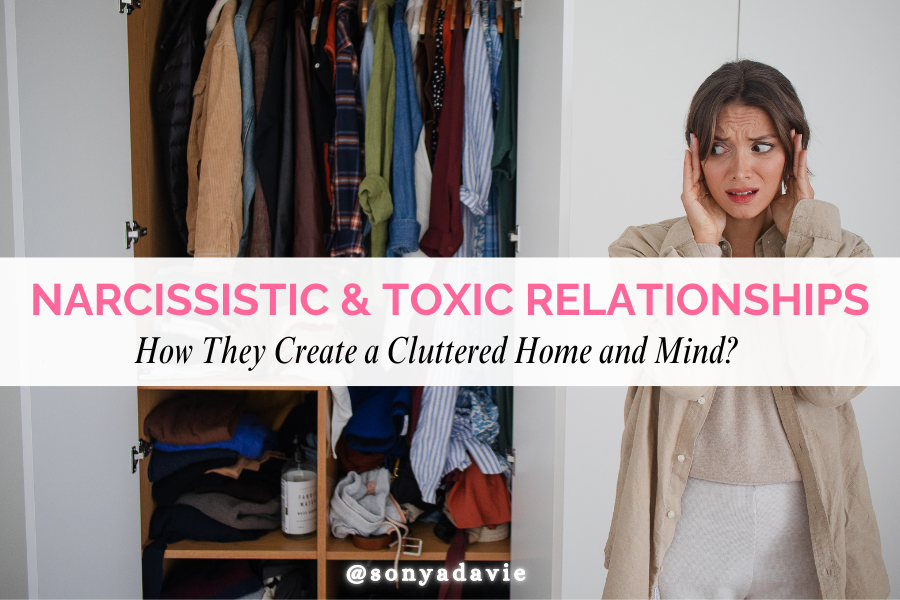
This post is all about how narcissistic relationships create a cluttered home and mind.
Your Cluttered Space is a Reflection of Emotional Trauma
That mess piling up? It’s not just about being too busy or disorganized. It’s often a reflection of emotional exhaustion—a physical manifestation of everything you’ve been carrying inside.
Today, let’s talk about why narcissistic relationships make it so hard to maintain a tidy space and what your surroundings might be telling you about your healing journey.
1. Brain Fog and Memory Issues
Narcissistic abuse keeps you in a constant state of stress, leading to cognitive overload. Your brain, wired for survival, struggles with focus, making simple tasks like organizing feel impossible.
Emotional trauma rewires the brain, impairing executive function—the area responsible for planning and organization.
2. Loss of Motivation and Emotional Exhaustion
Narcissists drain your energy, leaving you emotionally and physically exhausted. You may want to clean, but you just can’t find the strength.
Dr. Judith Herman, in Trauma and Recovery, describes how long-term emotional distress leads to burnout and apathy. If your space feels chaotic, it may be mirroring the emotional weight you’ve been carrying.
3. Boundaries Were Violated—Now It’s Hard to Take Control
Narcissistic relationships often involve boundary violations, leaving you unsure of how to assert control over your space. You may struggle to make decisions about what to keep, throw away, or organize because you were conditioned to question yourself constantly.
A helpful question to ask yourself: Does this bring me peace?
4. Emotional Numbness
Some days, you just don’t feel anything—including the mess around you. Emotional numbness is a common coping mechanism after narcissistic abuse.
When you’re in survival mode, your brain prioritizes emotional safety over everyday responsibilities. If clutter has taken over, it’s not a sign of laziness; it’s a sign of deep emotional fatigue.
5. Sleep Disruptions and Chronic Fatigue
Narcissistic relationships create relentless anxiety and hypervigilance, making it difficult to rest. Without proper sleep, even small tasks like washing dishes or folding laundry can feel like insurmountable challenges.
Sleep deprivation weakens cognitive function, making clutter and disarray feel overwhelming and unmanageable.
6. Disrupted Routines and Daily Instability
When you’re in a narcissistic relationship, your routines revolve around their moods and demands. Over time, this instability makes it hard to maintain structure in your daily life.
Dr. Gabor Maté, in When the Body Says No, explains how prolonged stress disrupts daily habits. Once your emotional energy is spent navigating their manipulation, even the simplest tasks can feel like a burden.
7. Loss of Coping Mechanisms
A narcissist thrives on control, often isolating you from your support system and discouraging self-care. Without proper coping mechanisms, your home can become an external representation of your internal struggle.
The lack of emotional resources translates into difficulty managing clutter and organization.
8. Financial Manipulation and Scarcity
Many narcissists use financial control to maintain power over their partners. If your finances were restricted, purchasing even basic home organization tools or cleaning supplies may have felt out of reach.
This financial strain contributes to a cycle where clutter builds up, reinforcing feelings of stress and helplessness.
Highly Sensitive Persons (HSPs) and the Deep Impact of Narcissistic Relationships
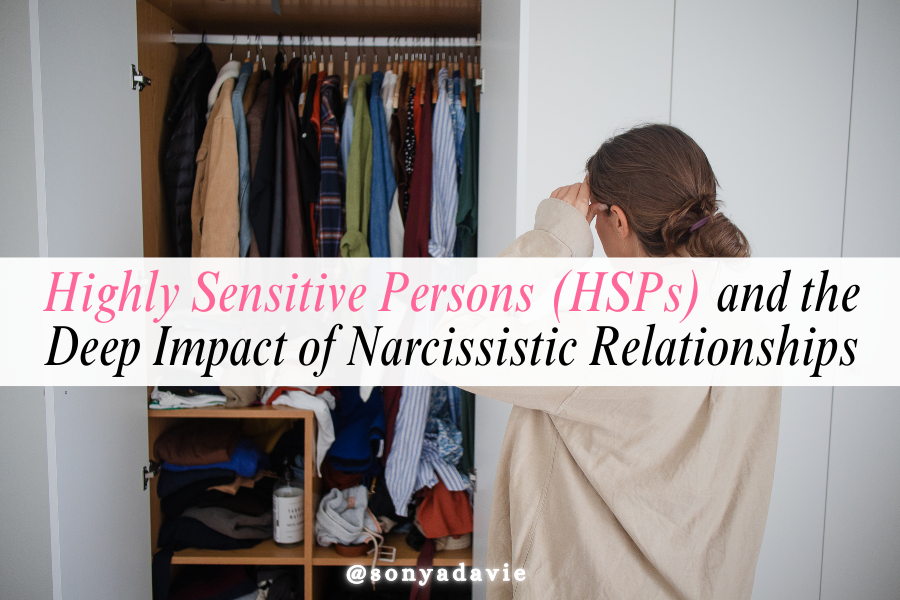
For Highly Sensitive Persons (HSPs), narcissistic relationships are even more damaging. Because HSPs process emotions deeply, they absorb negativity more intensely, making it harder to detach and heal. The constant manipulation, gaslighting, and invalidation create extreme mental fatigue, leaving little energy for daily tasks.
A once-cozy home can start to feel like an extension of the emotional chaos inflicted by the narcissist.
Additionally, because HSPs are more affected by their environment, a cluttered, disorganized space can heighten stress, increase sensory overwhelm, and even trigger emotional shutdown.
The connection between mind and space is powerful—when one feels chaotic, the other often follows.
Your Space Reflects Your Healing—But It Doesn’t Define You
If you’re struggling with clutter after leaving a narcissistic or toxic relationship, know this:
it’s not just about the mess. It’s a sign of the emotional burden you’ve been carrying.
Healing takes time, and so does rebuilding your space. The first step is acknowledging the impact of narcissistic abuse on your daily life. From there, small changes can lead to significant improvements.
How to Start Reclaiming Your Space
Here are some small steps to help you regain control of your environment:
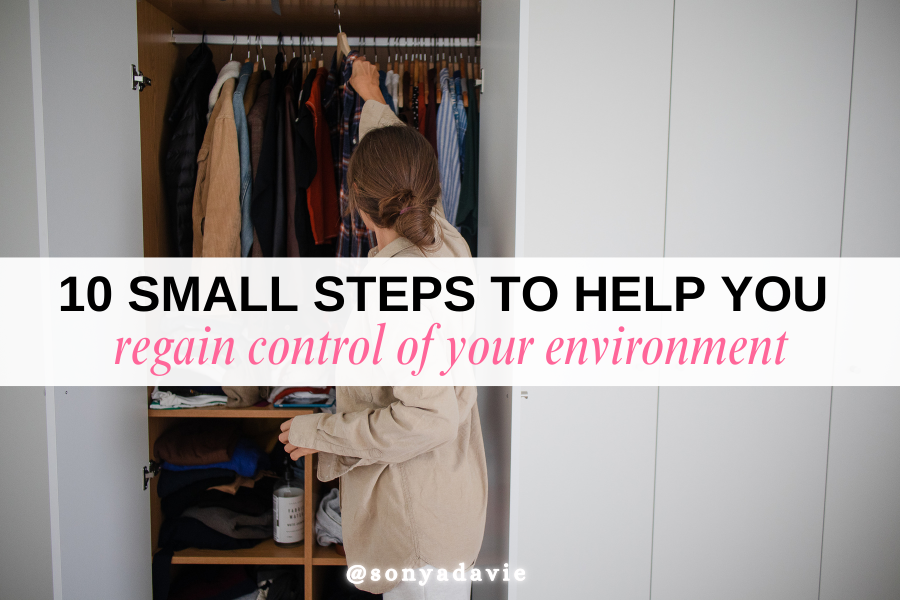
1. Celebrate Progress – No step is too small. Recognizing your achievements can help rebuild confidence and motivation.
2. Start Small – Pick one area, like a single drawer or a corner of a room, and clean for just 5-10 minutes. Small wins build momentum.
3. Set a Timer – Use a timer to clean in short bursts (e.g., 10-15 minutes) to keep tasks manageable.
4. Use the ‘One-Touch Rule’ – If you pick something up, put it away immediately instead of setting it down elsewhere.
5. Create a Clutter-Free Zone – Designate one small area (even a nightstand) to remain clutter-free, giving you a sense of peace.
6. Ask for Help – If possible, enlist a trusted friend or family member to help you declutter without judgment.
7. Use a Decluttering Mantra – Ask yourself: Does this item serve me? Does it bring me peace? If not, consider letting it go.
8. Prioritize Self-Care – Healing emotionally will make it easier to regain control of your space. Focus on sleep, hydration, and moments of calm.
9. Celebrate Progress – No step is too small. Recognizing your achievements can help rebuild confidence and motivation.
Why Decluttering Matters for Healing
A clutter-free home isn’t just about aesthetics—it’s essential for reducing stress and fostering a sense of calm.
Disorganization can contribute to anxiety, overwhelm, and mental fatigue.
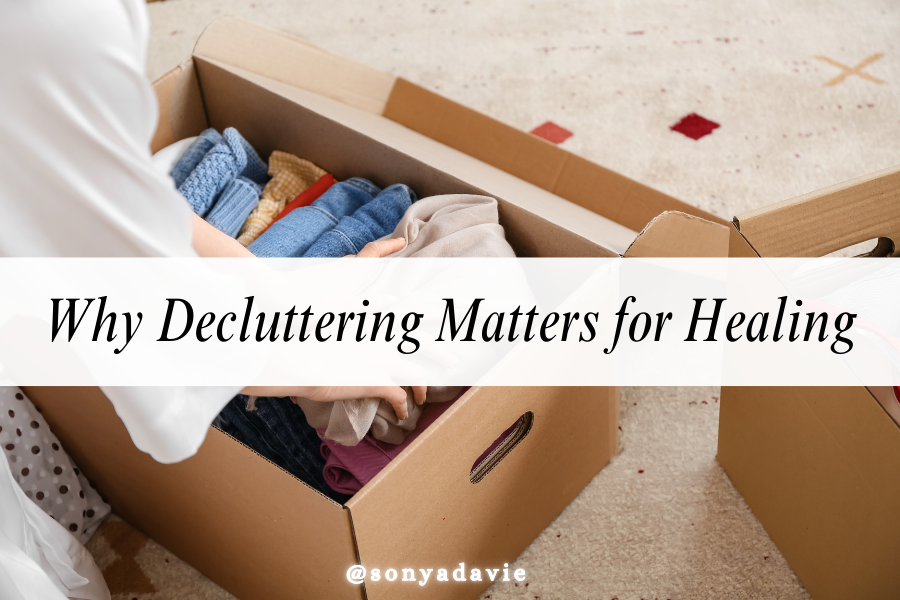
By simplifying your space, you free up mental energy and create an environment that supports your emotional recovery.
Declutter & Home Organization Essentials You May Need
If you’re ready to start organizing but don’t know where to begin, these essentials can help make the process easier and more manageable.
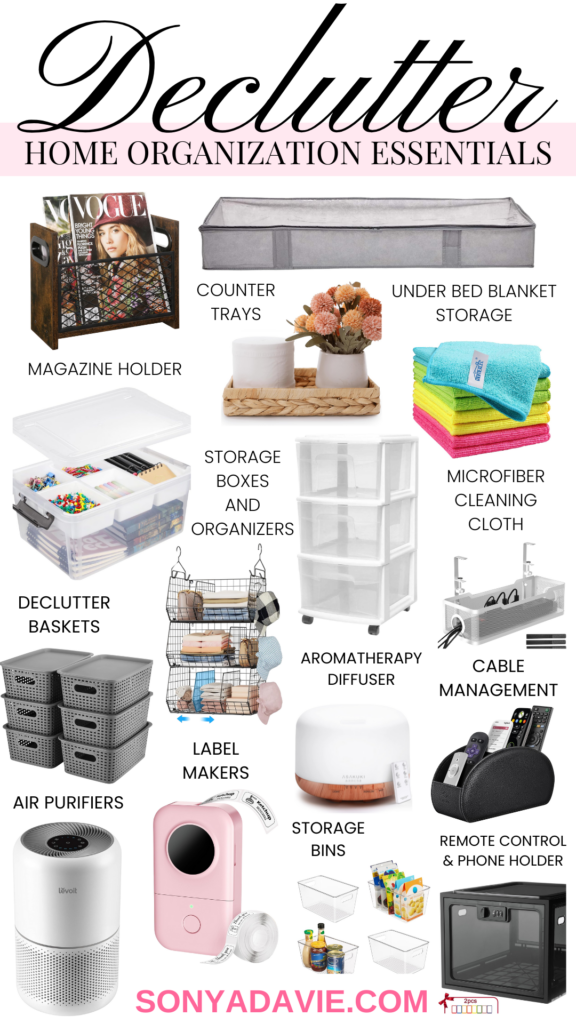
1. Storage Solutions
- Under-bed storage boxes
These provide extra storage without taking up space, perfect for out-of-sight storage.
- Hidden storage furniture
Coffee tables or ottomans with hidden compartments are ideal for keeping your space organized and visually calm.
2. Decluttering Must-Haves
- Declutter baskets
Set up designated baskets for each room where items can be temporarily placed for quick and easy sorting later.
- Catch-all trays
Place these on your entryway table or kitchen counter to help keep keys, wallets, and other essentials in one place.
- Label makers
Using labels for boxes, bins, and drawers helps ensure that everything has a designated place, making it easier to maintain order.
3. Cleaning and Freshening Tools
- Microfiber cleaning cloths
These are effective for dusting and cleaning surfaces without leaving behind particles, contributing to a cleaner, more organized home.
- Air purifiers
Improve the air quality of your home by removing allergens and pollutants that may contribute to mental or physical discomfort.
Ready to take control of your space and your peace of mind?
I’ve got you covered with even more decluttering and home organization essentials. Check them out here:
Be Gentle with Yourself!!!
If you’ve been reading this, take a deep breath and be kind to yourself. Healing from a narcissistic relationship takes time, and it’s okay if everything feels overwhelming right now.
Start small. Give yourself grace in the process.
Remember, always remember this —your home is just one part of your journey, not a measure of your worth. The clutter around you isn’t a reflection of who you are, but of what you’ve been through.
You are not alone. With time, support, and self-compassion, you can create a space that feels safe, peaceful, and truly yours again.
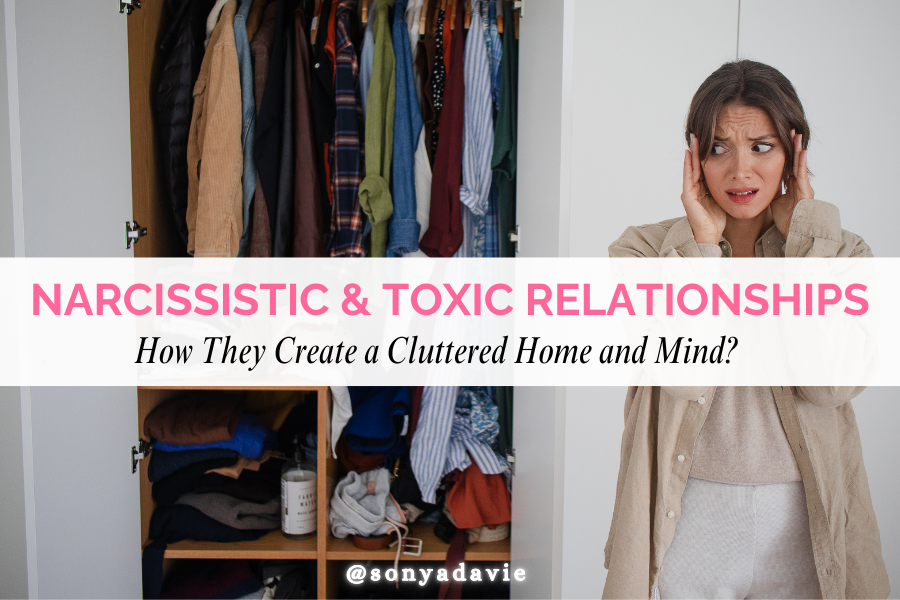
This post is all about how narcissistic relationships create a cluttered home and mind.
Related Post – The Vicious Cycle of Clutter and Mental Health You Need to Know About
+ show Comments
- Hide Comments
add a comment